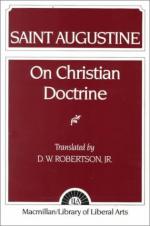
|
| Name: _________________________ | Period: ___________________ |
This quiz consists of 5 multiple choice and 5 short answer questions through Book Three.
Multiple Choice Questions
1. Augustine endeavors to answer many questions about what subject in Book One?
(a) The doctrine of God's omnipotence.
(b) The doctrine of Scriptural infallibility.
(c) The Christian conception of love.
(d) The Christian conception of Christ's deity.
2. What was the first type of criticism Augustine suggests his work "On Christian Doctrine" would face?
(a) Criticism that blending Greek and Christian philosophies was heretical.
(b) Criticism that his moral demands would be restricted to pagan converts.
(c) Criticism from those who cannot grasp his teaching.
(d) Criticism that his demands for linguistic studies were too exclusive.
3. What Scriptural defense does Augustine use for encouraging critics to consider the validity of "On Christian Doctrine"?
(a) Augustine argues that Scripture is the foundation of his writing, so his effort is divinely inspired.
(b) Augustine argues that Scripture contains many examples of people teaching others.
(c) Augustine argues, in his blending of Greek and Christian thoughts, that Scripture contains many examples of God using pagans to exhibit his will.
(d) Augustine argues that Scripture does not negate any teaching extrapolated from Scripture.
4. How can recommendations Augustine makes from Book Three prevent students from falling into the trap that misleads them?
(a) Augustine recommends that students learn the culture, language, and history from the periods that Scripture was written to develop the skill to interpret Scripture intelligently.
(b) Augustine warns against allowing the increased knowledge of students from developing into pride.
(c) Augustine painstakingly differentiates between signs and things to guide students away from misapplying both.
(d) Augustine devotes much of Book Two to detailing the demands on the serious student of Scripture.
5. What is the problem for the critics that Augustine addresses in the Preface when they choose to teach?
(a) If these critics believe that understanding Scripture can only be achieved through the application of "special gifts", doesn't their effort to teach expose their students to personal bias that might interfere with their "special gifts"?
(b) If these critics believe students of Scripture can only receive understanding through "special gifts", why do they attempt to teach about "special gifts"?
(c) If God only communicates the truth of Scripture through those who have "special gifts", is not God limiting his communication with the pagan who has not received such gifts?
(d) If these critics believe that Scripture can only be achieved through "special gifts", isn't God's power of communicating limited out side of his act to give the gifts?
Short Answer Questions
1. With what prediction does Augustine start "On Christian Doctrine"?
2. What should be the nature of the relationship between humans and God according to Augustine?
3. What does Augustine call the types of grammar used through Scripture?
4. By the end of Book Two, Augustine devoted much of this text to refuting critics who believe Scriptural interpretation comes simply. What does this infer of Augustine's methods of debate?
5. By making the demands of understanding Scripture difficult, who was Augustine criticizing?
|
This section contains 637 words (approx. 3 pages at 300 words per page) |

|




